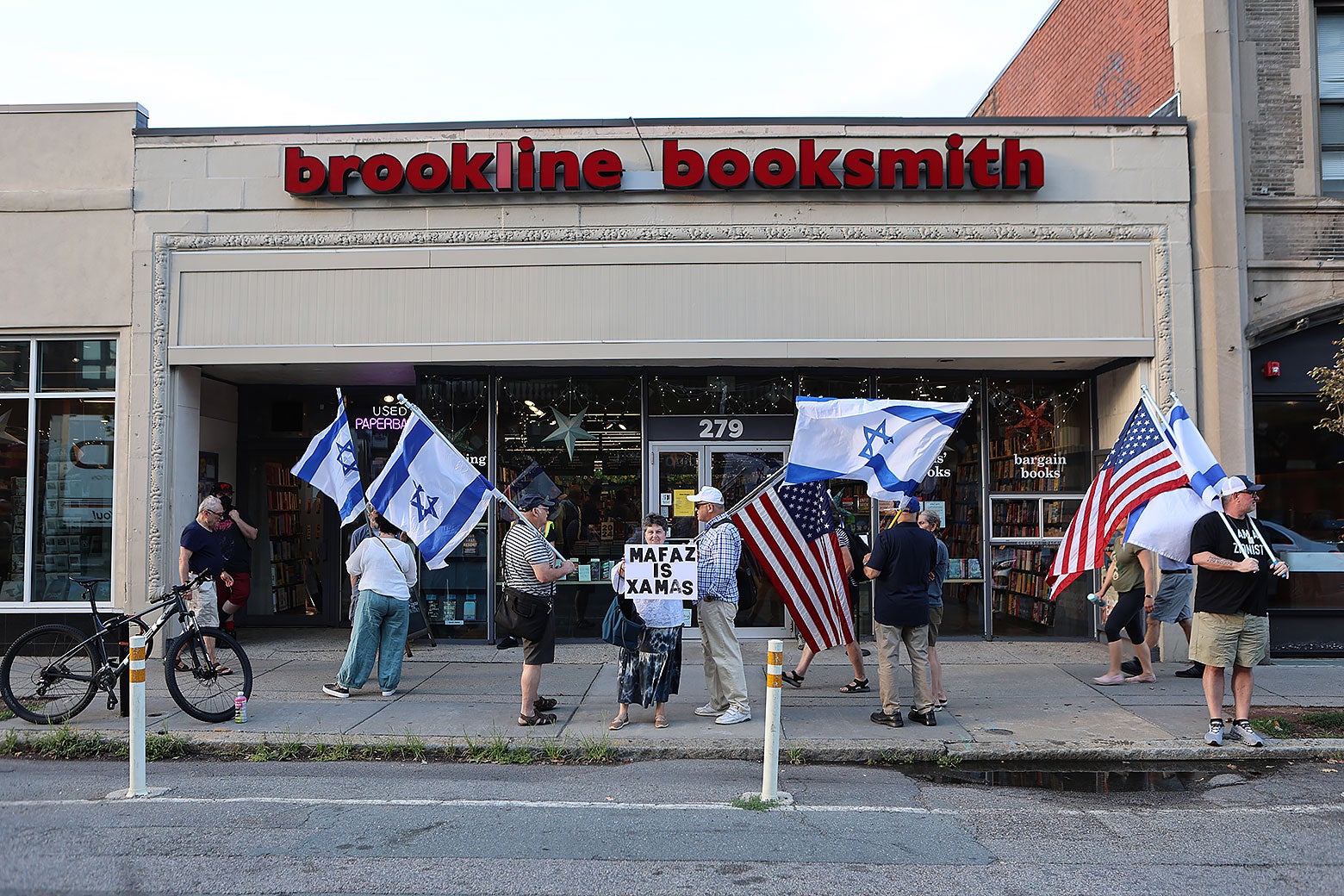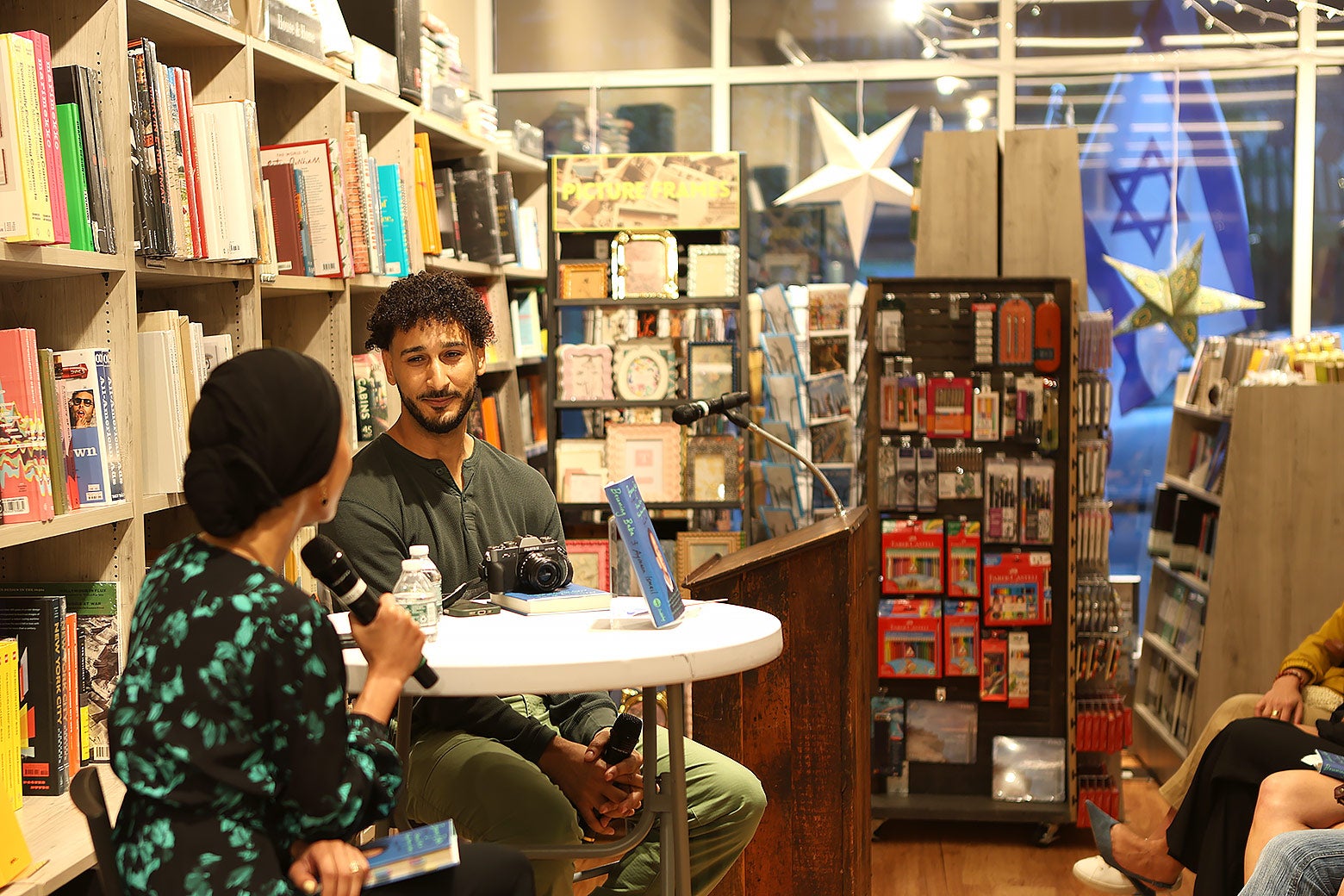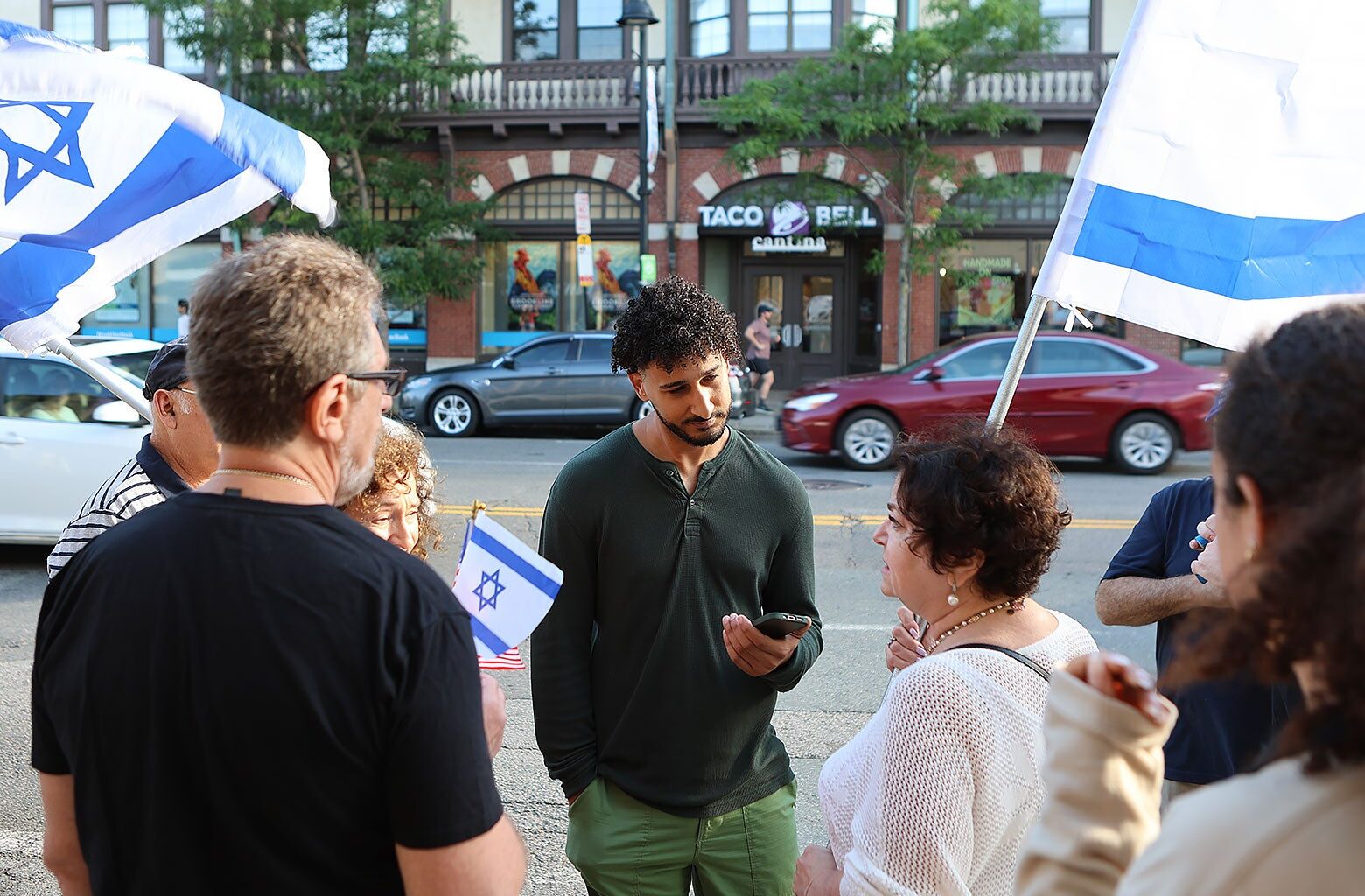Sign up for the Slatest to get the most insightful analysis, criticism, and advice out there, delivered to your inbox daily.
“The situation has escalated a bit.”
I got the email just as I boarded my flight to Boston for the second stop on my book tour. Brookline Booksmith was hosting an event for my memoir, Becoming Baba. It’s not a polemic. It’s about having Muslim parents and then trying yourself to raise Muslim kids in a country that can often be hostile toward people like us. It’s written to chronicle what Arab fathers everywhere are feeling, and so my memoir does include a short chapter narrating my heartbreak when I watch footage of the aftermath of Israeli airstrikes and witness lifeless toddlers, pulled from the rubble in Gaza, who resemble my own. How could it not?
For a subset of local pro-Israel activists, that was too much. I hadn’t known, but the email explained that since announcing my event, the staff at the Boston bookstore were being called on to cancel my reading. When it became apparent the store wouldn’t be doing so, the activists began planning a protest.
The email asked if I wanted to cancel. But the event was sold out. How could I risk turning away people who were traveling from far away to attend? I replied that I was still coming.
That evening in Boston turned out to be one of the strangest, most revealing experiences on my book tour. A group of demonstrators with Israeli flags formed a picket line, forcing anyone who wanted to attend to make their way past them. I wanted to know why the book, which I think of as a gentle, introspective work by a Muslim undergoing the biggest change in his life, warranted this type of opposition. So I showed up early and went out to meet the protesters directly. I wanted to understand why my presence was being treated like a threat. I hoped there was something worth salvaging in that exchange.

Protesters demonstrating during the author’s book reading.
Amy K. Nelson
Outside the bookstore, the tension was immediate. A cluster of protesters waved enormous Israeli flags, the kind you’d expect to see atop a government building. A silent counterprotest barely registered, just two Jewish women holding poster boards with images of emaciated Palestinians. Peace marshals from Jewish Voice for Peace stood nearby in neon vests, projecting the calm authority of seasoned school chaperones. I’d seen marshals like them at left-wing rallies before, usually working to intervene and de-escalate tension before things spiraled into violence. This time, they were there to protect a business and its patrons, people who just wanted to attend a reading or shop in peace. It was clear I was stepping into a community that had been embattled long before my book arrived.
One store employee, who asked not to be named, told me I was stepping into a much longer local campaign. “It’s not just you,” she said. “It’s pretty much a community culture war now.”
I had gotten there a few hours early, hoping to settle in before the crowd arrived. Inside, it was just a really beautiful neighborhood bookstore. A few staffers wore kaffiyehs, a few yarmulkes. The shelves held everything from Palestinian poetry to Alan Dershowitz. Customers browsed quietly; one woman thumbed through travel books, and a man sat on the floor leafing through a paperback in the fiction aisle. I made a beeline for the robust children’s section to pick out something for my kids. Like any beloved indie bookstore, this was a place for exploring, bumping into old friends, or finding a Boston-themed butter dish to buy as a quirky gift. There was virtually everything in stock. Even protesters I had recognized from outside had smiles plastered on as they looked through the options.
Still, the scene playing out in front of the store was impossible to ignore. I stepped outside to approach the protesters. I didn’t expect to change anyone’s mind, but I was genuinely curious: Who were these people who found my memoir so threatening? If they could see me, just a person standing calmly in front of them, maybe we could get past the idea of people as politics. I hoped that by meeting them face-to-face, I could remind them I wasn’t just an abstraction to rally against. I was a human being. I was here to promote my book, not to make any passive threats against anyone.
I’d closely read the earlier warning from the events coordinator, especially the part about Scott Hayes, a former U.S. Army service member present that day who had been involved in a shooting at a prior demonstration. (His charges are set to be dismissed in September if he follows certain conditions.) He had organized the protest outside and had been the first to arrive, hoisting an enormous American flag and an Israeli flag, wearing a shirt that read: “I Am a Zionist.”
I introduced myself. “I know who you are,” he said, then turned to another protester: “He’s the author.”
Hayes was calm and disarmingly courteous. He said he had nothing against me personally and promised to police the others if anyone got disruptive. “Come get me and I’ll drag them the hell out,” he said, smiling.
He claimed that this wasn’t a protest, just “a pro-Jewish solidarity presence” in a heavily Jewish neighborhood. He repeatedly asked the others, each equipped with massive Israeli flags, to keep the sidewalk clear, but the sheer size of the flags made that impossible. Every few minutes, they were heckled by passersby. A woman muttered “Free Palestine” as she brushed past. Another called them “Nazis.” One protester shouted at a woman who had arrived to counterprotest: “You’re Jewish, but you like Hamas!” and “You’re supporting people who say ‘Kill all the Jews.’ ”
An Israeli woman tried reasoning with Hayes, telling him she was “embarrassed” by her country. He shrugged off the civilian death toll and said there was “something rotten in Palestinian culture.”
He told me the protest was in response to my book, as well as my moderator, Mafaz Al-Suwaidan: “She’s crossed the line into antisemitism.” When pressed, he pointed to her anti-Zionist activism at Harvard University, where she is a Ph.D. candidate. “Anti-Zionism,” he said, “is just a shield for antisemitism.”
I suggested that it might be possible he was misinterpreting political critique as hate. “No,” he said. “Because I consider the broader context.”
Then a woman named Pearl approached, asking aggressively if I myself was Palestinian. Before I could answer her, a store staffer tapped me on the shoulder. The event was starting. So I headed inside.
The protest outside my event at Brookline Booksmith didn’t come out of nowhere. It was the culmination of a yearlong campaign that store leadership had watched unfold in real time.
According to Lisa Gozashti-Riddle, Brookline’s longtime co-owner and manager, the shift began in January 2024, after the store had hosted a virtual poetry fundraiser for Mosab Abu Toha, a celebrated Palestinian poet whose English-language library in Gaza had just been destroyed by Israel. “We had 20 poets from around the world, including Mosab, who joined us from Egypt,” she told me. They raised more than $30,000 to purchase and ship books to a new library in Gaza upon reconstruction.
After that, the threats started. “I was trying to protect my staff while fielding all the calls myself,” she said. One caller asked to speak to “Hitler.” Someone else, in a message, said that Gazans “don’t read books. They only want guns.” To avoid another flare-up, the store moved pro-Palestinian programming online.
But the scrutiny didn’t stop. “People started coming in daily to count the number of Palestinian books we had. I’ve seen the spreadsheets, the circle graphs, the reports they’ve sent out accusing us of bias.” Some called the store a “hotbed for Islamic fundamentalism” and accused it of “inculcating the youth.”
Then came Becoming Baba. “This wasn’t a book we flagged,” Gozashti-Riddle said. But the emails came anyway. Some asserted that hosting me was “an act of incitement.” One message said, “We can overlook the author, but if that woman attends, you’re sending a message that pro-Israel Jews aren’t safe at Booksmith.” The message linked to Canary Mission. “That was a watershed moment,” Gozashti-Riddle said. “We realized the people organizing this weren’t rational. And when you’re dealing with that level of irrationality, it’s scary.”
So the staff took precautions: installing peace marshals from Jewish Voice for Peace and alerting local police. “After your event, I finally started using the word harassment,” she said.
Jed Smith, co-owner and son of the store’s founders, said that since Oct. 7 the atmosphere had changed. “I saw one comment from a longtime customer who said, ‘On Oct. 8, I decided not to go to that bookstore anymore.’ ”

The author speaking with moderator Mafaz Al-Suwaidan.
Amy K. Nelson
Smith said staffers had vetted me and my book closely for anything incendiary but had “found none” of the content people had warned them about. They consulted with the American Booksellers Association, American Booksellers for Free Expression, the National Coalition Against Censorship, and local police. They chose not to postpone my event or move it online.
Smith added that, although the store still had patrons’ support, the campaign had taken a toll. “Our customers walked right through the protest lines,” he said. “We have tremendous community support. We have a lot of love. I’m also scared shitless. Seriously. I’m scared about our employees’ safety. And we have to make decisions that are not easy.”
As the event began in Brookline Booksmith, it felt like entering a different emotional register. The space was standing room only. Still, the protest outside was visible through the big front windows, and a few protesters had taken seats in the first row, arms crossed, staring down my moderator, Mafaz, and me.
Before we began, Mafaz turned to me and joked about a sign that read “Mafaz is Xamas.” “I thought it said ‘Mafaz Is Christmas!’ ” she said, setting a warm tone for the conversation that followed.
She opened by addressing the moment: “Moral clarity invites backlash. If these are the consequences for standing against a genocide, then I’m proud to bear them.” A heckler shouted “Genocide by Hamas!” but the room didn’t take the bait.
What followed was what I’d hoped for, a thoughtful conversation about Islam and parenthood across generations. Mafaz asked about the centrality of women in a book about masculinity, about fatherhood as a spiritual project, and about how my mom felt about my rehashing, in such a public way, the story of her catching me with a girl at home.
The protesters in the front row didn’t disrupt the discussion, but their presence was intimidating. When Mafaz asked me to speak about Gaza, I hesitated. I knew that the demonstrators were waiting to pounce on anything they could frame as unbalanced.
I answered cautiously. I talked about my lived experience, the grief of seeing mangled children pulled from the rubble who look like my own. I didn’t try to provoke. I focused on speaking plainly and without flinching.
The store was packed with readers who had carved out time, traveled across town, brought their kids or their friends. About half were Muslim or Arab, and the goal of the reading was the same as writing the book: to have the kind of honest, unguarded conversation that’s so rare when you’re used to being talked about. I wrote it to reflect our inner lives and to offer something tender and searching and real. And that night, despite everything happening outside, that’s exactly what we made room for.
After the event, a long line formed. One of the protesters leaped to the front. She introduced herself as Sheila. She told me she had read the book the day it came out. All of it. “I have a couple of concerns,” she said, her hands and lips visibly shaking. She challenged me on why I hadn’t included more about Israeli suffering and why Palestinians weren’t sheltering in Hamas’ tunnels. When I pointed out that 2023 had already been the deadliest year on record for Palestinian children before Oct. 7, she replied: “Those are kids with guns.”
I offered to sign her book. “Not now,” she said with a smile.
Peace marshals eventually nudged her along, but I offered to keep the conversation going by exchanging contact info.
The World’s Deadliest Addiction Is Popping Up on Brain Scans. And It’s Not Even a Drug.
I’m a Student at Harvard. Almost Everyone I Know Wants the Exact Same Type of Job.
This Content is Available for Slate Plus members only
I Wrote a Book About Being a Dad. Pro-Israel Protesters Showed Up to Object. I Asked Them Why.
This Content is Available for Slate Plus members only
Did the Coldplay Kiss-Cam CEO Really Have to Get Fired?
I wrote Becoming Baba to unpack the pressure of passing down to your kids a faith your parents fought to preserve. Since publishing it, I’ve been moved to hear from readers that this struggle feels deeply human and relatable to anyone who grew up with religion, not just Muslims. The same goes for Gaza. You don’t need to be Arab or Muslim to feel something when you see those images. I can’t stand to hear my own kids cry for even a minute. I can’t imagine how those parents in Gaza must feel. But I know how I feel. And in a story about becoming a parent while this is happening, that grief becomes part of it. Tens of thousands of children are confirmed dead, with many more still uncounted, buried beneath the rubble. Of course I feel something. I expect you to feel something too. Especially parents.
My book only briefly mentions Gaza’s parents and kids, and it triggers protests.
I didn’t expect to change Sheila’s mind. But I hope she and others like her might simply let us breathe.
My book mentions Oct. 7, including the killing and kidnapping of Israelis. But given the wasteland Gaza has been reduced to—the inconceivable yet still rising death toll, and the ongoing merciless penning in of starving civilians, including shooting them as they try to retrieve single sacks of flour—I hoped she could understand why I wrote about Gaza.
I hoped that, for once, Arab and Muslim writers might not be asked to grieve on tiptoe and only if it never makes others uncomfortable, or else that grief will be reframed as somehow threatening.

Aymann Ismail
I Heard Lots of Tales of What Fatherhood Would Bring. One Trip Showed Me Like No Other.
Read More
If she felt that this was impossible, if her politics couldn’t accommodate even a flicker of sadness for Palestinians without applying equal or greater sadness to Israelis, I hoped she might consider why she had drifted from the compassion and perspective she demanded of me.
Or, at the very least, I hoped she might ask herself why the mere mention of dead Palestinian children made her visibly shake.
Days later, Sheila emailed me to say she’d returned my book.
It became evident to me that she didn’t want balance. She wanted me to know my place in her emotional hierarchy. Her grief had to come first. Mine required a disclaimer. “Not a thought in the world,” she wrote, for the horror Israelis experienced, “that no Palestinian EVER experienced.”
More than 50,000 children in Gaza have been reportedly killed or injured since October 2023, in what UNICEF calls a “harrowing list of unimaginable horrors.” More remain uncounted, as they are still missing under the rubble.

Sign up for Slate’s evening newsletter.

